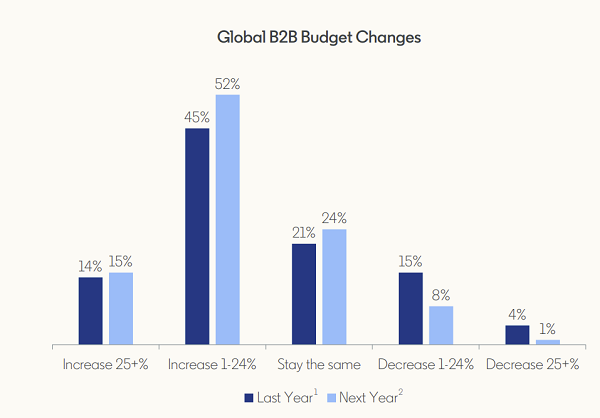LinkedIn has released its meaty, 86-page B2B Marketing Benchmark Report that summarises trends and industry shifts that could have an impact on planning for the rest of 2022.
The report gathered data from nearly 2,000 (1,954) CMOs, CFOs and senior marketers in the US, UK, Germany, France, India, Australia, Singapore and Brazil.
Budgets are on the up
Most B2B budgets around the world have increased or stayed the same, despite gloomier outlooks relating to the economy. In fact, the report highlighted that keeping brand and demand ad spending high during a slowdown can help brands bounce quicker when things pick up again.
Amid higher ad budgets is a sense of optimism among CFOs. 60% of them feel good about their ability to drive revenue for the coming year. In terms of ad spend, lead generation (36%) receives the biggest slice of the pie – closely followed by brand building (30%).
The majority of that spend is on acquiring new customers, rather than retaining existing ones.
Never too senior to upskill
CMOs with soft skills like problem-solving, innovative thinking and adaptability are becoming more important. Additionally, CMOs are learning more creative skills, which is represented by a 46% increase in the amount of creative skills added to marketers’ LinkedIn profiles in the past year.
Looking at how important platforms like TikTok have become, it should be no surprise that 43% of CMOs want to develop their storytelling skills.
On a broader level, LinkedIn found that 84% of CMOs have strengthened their skills to show the value of brand marketing, while 80% said that learning the language of finance helped them secure a greater marketing budget.
Nearly half of CMOs and CFOs say that CMOs are expected to demonstrate how marketing impacts the bottom line. Increasingly, the role isn’t just about marketing and a lot of senior people are recognising that.
Brand is more important
Across the globe, LinkedIn says that more B2B organisations see the value in building brand and view brand-building efforts as a creative way to generate revenue. As one UK-based but unnamed director says…
“The best revenue generating campaigns are also those that are the most unconventional. When we’ve run some tests that could have been seen as ‘risky’, the performance was usually better than for conventional campaigns.”
To achieve those goals, 60% of B2B marketing leaders say companies have increased spending on growing brand awareness. That could be because brand building is seen as a way to drive short-term goals and increase long-term value through brand reputation and relevance for core audiences.
Marketing leaders understand how important branding is, and 7/10 say that they have the right creative skills to support brand building.
The whole funnel
Despite lead generation and new businesses being a focus for B2B leaders, they are still looking at a full-funnel approach to marketing. Brand building (30%) and demand generation (20%) still command a healthy chunk of the budget – while 15% of marketers will focus on account-based marketing.
Across all sectors surveyed (tech, financial services, agency, health, education and professional services), generating new business comes out top for ad spend. It also wins in all regions (North America, LATAM, EMEA, APAC).
Never underestimate the personal touch
After two years of virtual reality calls, 6/10 marketing leaders say they want to use in-person events to boost their marketing efforts and 60% say in-person events are the best marketing channel.
“B2B marketing leaders identified in-person events as the most effective marketing channel; 3 in 5 plan to use this strategy to meet their needs.”
Video (59%), thought leadership content (57%) and display ads (50%) were also mentioned as effective marketing channels – while only 26% of marketing said generative AI would fit the bill.
Everyone wants AI – not everyone can use it
Three-quarters of marketing leaders are excited about generative AI – however, the newness of the technology means few have mastered it yet.
“Even though B2B marketers are realizing that emerging technologies, such as generative AI, will help them to deliver more impactful, personalised campaigns in the near future, much of the marketing potential of AI continues to go unrecognised.”
Skill limitation doesn’t mean that marketers can’t recognise its potential. 81% of marketers predicted its use would increase in the next year, which is reflected by the 142% increase in AI-related posts by B2B marketers on LinkedIn.
“Members and companies within IT services/IT consulting have been the most active contributors to the “Generative AI” conversation, indicating a relevant B2B opportunity.”
Just under half of marketing leaders say they’re using AI for marketing, while 75% say they are likely to use it to promote business when opportunities present themselves. However, just over 20% of marketers say they have a “somewhat good” understanding of the technology, which seems to indicate a knowledge deficit across the industry.
Arun Pattabhiraman, CMO, Sprinklr
“When properly integrated, generative AI empowers marketing and advertising teams to achieve near-perfect content and ideas with remarkable speed. Its capabilities go beyond a mere generation or paraphrasing of copy; for instance, we can leverage generative AI to support the planning stages of the campaign lifecycle.”
There’s going to be a huge race to the AI finishing line – and if your brand can get ahead of the pack – there could be serious gains to be found.




RECOMMENDED FOR YOU
LinkedIn Upgrades Campaign Measurement
LinkedIn has unveiled a new data-driven attribution model, designed…
LinkedIn has unveiled a new data-driven attribution model, designed…
[NEW STUDY] Influencer Marketing Comes Of Age
For years, influencer marketing has been synonymous with B2C…
For years, influencer marketing has been synonymous with B2C…
LinkedIn Updates Posting Best Practices
LinkedIn has shared updated guidance on the types of…
LinkedIn has shared updated guidance on the types of…